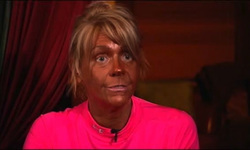
New Jersey Governor Chris Christie signed a bill into law on Monday banning children under 17 from using commercial tanning beds, a move stemming from the case of a local woman accused of taking her 5-year-old daughter into a tanning booth, which was later found to be a false story.
Under the new law, youth age 17 and older must have a parent or guardian present for an initial consultation with a tanning salon. It also bans children under 14 from getting spray tans in tanning salons.
Under the new law, youth age 17 and older must have a parent or guardian present for an initial consultation with a tanning salon. It also bans children under 14 from getting spray tans in tanning salons.
Christie said that while he does not favor government regulation of small business, the new law was important for protecting the safety of minors.
"Governmental regulation of the private sector should always be carefully scrutinized, and sparingly adopted," he said in a statement. "The new restrictions imposed by this bill followed a single but breathlessly reported incident of a parent bringing a minor child into a tanning facility."
Patricia Krentcil of Nutley, New Jersey, was arrested in April 2012 after her daughter showed up at school with a sunburn and officials accused her of taking the child into a tanning booth.
Krentcil, who became known in tabloid stories as the "Tan Mom," testified that her own chocolate-brown hue came from many hours spent under the intense ultraviolet light of a tanning bed or out in the sun soaking up rays.
She denied exposing her daughter to a tanning session, and a grand jury opted not to indict her on charges of endangering the welfare of a child.
New Jersey was already one of several states that have regulations prohibiting anyone age 14 or younger from tanning with commercial ultraviolet devices because of the risk of skin cancer. The new law extends that ban to older teenagers.
Signing the bill into law, Christie noted the skin cancer risk and also that tanning before age 35 has been shown to increase the risk for melanoma by 75 percent.
"Governmental regulation of the private sector should always be carefully scrutinized, and sparingly adopted," he said in a statement. "The new restrictions imposed by this bill followed a single but breathlessly reported incident of a parent bringing a minor child into a tanning facility."
Patricia Krentcil of Nutley, New Jersey, was arrested in April 2012 after her daughter showed up at school with a sunburn and officials accused her of taking the child into a tanning booth.
Krentcil, who became known in tabloid stories as the "Tan Mom," testified that her own chocolate-brown hue came from many hours spent under the intense ultraviolet light of a tanning bed or out in the sun soaking up rays.
She denied exposing her daughter to a tanning session, and a grand jury opted not to indict her on charges of endangering the welfare of a child.
New Jersey was already one of several states that have regulations prohibiting anyone age 14 or younger from tanning with commercial ultraviolet devices because of the risk of skin cancer. The new law extends that ban to older teenagers.
Signing the bill into law, Christie noted the skin cancer risk and also that tanning before age 35 has been shown to increase the risk for melanoma by 75 percent.
 RSS Feed
RSS Feed